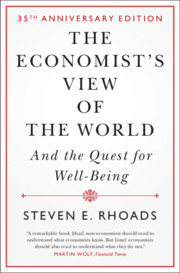Book contents
- More Praise for The Economist’s View of the World
- The Economist’s View of the World
- The Economist’s View of the World
- Copyright page
- Dedication
- Contents
- Preface
- Acknowledgments to the First Edition
- Acknowledgments
- Introduction
- Part I Useful Concepts
- Part II Government and Markets, Efficiency and Equity
- Part III The Limits of Economics
- 7 The Economist’s Consumer and Individual Well-Being
- 8 Representatives, Deliberation, and Political Leadership
- 9 Conclusion
- Notes
- Index
9 - Conclusion
from Part III - The Limits of Economics
Published online by Cambridge University Press: 24 September 2021
- More Praise for The Economist’s View of the World
- The Economist’s View of the World
- The Economist’s View of the World
- Copyright page
- Dedication
- Contents
- Preface
- Acknowledgments to the First Edition
- Acknowledgments
- Introduction
- Part I Useful Concepts
- Part II Government and Markets, Efficiency and Equity
- Part III The Limits of Economics
- 7 The Economist’s Consumer and Individual Well-Being
- 8 Representatives, Deliberation, and Political Leadership
- 9 Conclusion
- Notes
- Index
Summary
Almost all economists, left and right, love markets. Studies show that markets are more efficient than government because, in the private sector, managers and owners reap the rewards when they efficiently respond to consumer demand. The power of markets increases when, as in the modern world, the uses of resources have multiplied beyond measure.
Dedicated policy professionals are focused on improving their programs. Economists are more likely to also focus on opportunity cost, the damage to other programs when too many resources go to any single one. They are aware that “setting priorities” should not mean our top priority gets all the resources. In some absolute sense, safety is more important than recreation. But we should not abolish all youth baseball leagues, because a child is very rarely struck in the head by the ball.
Despite their frequent usefulness, economists place unbalanced emphasis on narrow self-interest as both compelling motive and route to happiness. Competing disciplines can lead to a deeper perspective. Positive psychology reminds us that friends and family lead to more happiness than wealth. That discipline focuses on admiration and elevation, as does the discipline of virtue ethics. These very different disciplines also agree on the importance of gratitude; it is both a virtue and a feature of the road to happiness. We should be grateful for our economy, which has led us to income per capita that is 25 times what it was in 1820. Liberty sparks our economic dynamism and is also at the heart of our constitutional democracy. In difficult times in particular, we should be grateful for our freedom.
Keywords
- Type
- Chapter
- Information
- The Economist's View of the WorldAnd the Quest for Well-Being, pp. 242 - 254Publisher: Cambridge University PressPrint publication year: 2021

